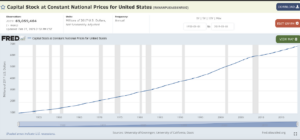Jeffrey Blehar has an easy and good time poking fun at some of the ‘leaders’ of the pro-Palestine ‘student’ protestors at Columbia. A slice:
But they are now entrenched inside the building, have set up camp and barricaded the doors, and are refusing to budge in the face of the threats of expulsion. (Only now, at this late moment, is expulsion finally on the table for Columbia.) And they have found a spokeswoman. Allow me the pleasure of introducing you to one Johannah King-Slutzky, Ph.D. candidate in the English and Comparative Literature Department at Columbia. She focuses on . . . well, “stuff,” near as I can gather from her biography page on the department’s website. She IS also (and unsurprisingly) happy to mention she comes from a lengthy background in left-wing protest:
My dissertation is on fantasies of limitless energy in the transatlantic Romantic imagination from 1760-1860. My goal is to write a prehistory of metabolic rift, Marx’s term for the disruption of energy circuits caused by industrialization under capitalism. I am particularly interested in theories of the imagination and poetry as interpreted through a Marxian lens in order to update and propose an alternative to historicist ideological critiques of the Romantic imagination. Prior to joining Columbia, I worked as a political strategist for leftist and progressive causes and remain active in the higher education labor movement.
I’m guessing that this is a lady with a lot of free time on her hands, is all I’m saying. (Look, some theses just take longer to draft than others.)
[DBx: More and more I’m convinced of the accuracy of Schumpeter’s prediction that capitalism will nourish and equip its ignorant yet merciless executioners.]
“A Tale of Three Universities: Northwestern appeases its protesters. Florida enforces its rules. Columbia is a mess.” A slice:
The University of Florida took a different approach. In a statement Monday evening, the school said protesters who engaged in prohibited activities would face a trespassing order and an “interim” suspension from the university. “This is not complicated,” a spokesman said. “The University of Florida is not a daycare, and we do not treat protesters like children—they knew the rules, they broke the rules, and they’ll face the consequences.”
That’s appropriate, and it’s also a life lesson. Florida’s message shows respect for a liberal education environment and students who attend college to learn something. Appeasement does the opposite.
At Columbia, meanwhile, President Minouche Shafik tried to negotiate with protesters to coax them to dismantle their Little Gaza, but students escalated instead. After faculty objected to New York police arrests of student protesters, Ms. Shafik said she wouldn’t invite law enforcement back on campus. On Monday night protesters rewarded her forbearance by breaking a window, taking over Hamilton Hall, and hanging an “Intifada” banner.
Richard Rahn is bearish on Ivy League ‘schools.’
Jon Miltimore: “A Marxist economist [Richard Wolff] explains why socialism could never reate a PS5.” Here’s Jon’s conclusion:
Wolff, like Marx, seems completely unaware of what drives market innovation. To believe that a PS5 would emerge from a process of individuals talking to one another about how much they should be paid and weighing one’s interest for a gaming system against the interests of co-workers who desire something else is to ignore both history and the fundamentals of economics.
But perhaps this should not surprise us.
“If socialists understood economics,” the Nobel Prize-winning economist F. A. Hayek once quipped, “they wouldn’t be socialists.”
Benn Steil and Elisabeth Harding have a new global inflation tracker.
John Stossel and GMU Econ alum Ed Stringham understand the reality of government.
Kenneth Costello argues that “economists’ advocacy for a carbon tax is misguided.” Two slices:
Overall, models that calculate the SCC [social costs of carbon] are non-robust, and highly dependent on the parameters and assumptions contained in them. Interest groups, policymakers, analysts and others can easily manipulate the models to produce results to their liking. Using a discount rate of two or three percent, rather than seven percent, for example, can have a significant effect on the SCC calculation. One then can legitimately question whether predictions of the SCC actually reflect unbiased analysis. When policymakers apply an inflated SCC, restrictions on carbon emissions (whether by executing a high carbon tax or tighter controls), require society to expend excess resources on curbing emissions — that is, the additional abatement costs exceed the reduced damages from emissions, causing a net welfare loss.
…..
It may well also be true that existing government measures to reduce carbon emissions (electric-vehicle mandates, renewable-energy subsidies) have already moved emissions near or even below the optimal level. An additional measure such as a carbon tax may actually lower economic efficiency by increasing abatement costs more than the added benefits. Although this becomes an empirical question, one can conceive conditions under which this outcome becomes imaginable. This illustrates yet another example where blackboard economics has overlooked a real-world condition that could make a carbon tax less attractive.


 When the Trump administration decided in 2018 to impose a 25 percent tariff on all imported steel, the same employment tradeoffs emerged…. The steel industry employs about 147,000 workers, while there are roughly 2.3 million workers in steel-using industries. The tariffs cost Ford Motor Company a billion dollars in added costs of production because the tariffs made American steel the most expensive in the world. The higher steel costs also hurt Caterpillar and John Deere, as well as machinery producers.
When the Trump administration decided in 2018 to impose a 25 percent tariff on all imported steel, the same employment tradeoffs emerged…. The steel industry employs about 147,000 workers, while there are roughly 2.3 million workers in steel-using industries. The tariffs cost Ford Motor Company a billion dollars in added costs of production because the tariffs made American steel the most expensive in the world. The higher steel costs also hurt Caterpillar and John Deere, as well as machinery producers.  The total capital stock available to U.S. workers and businesses, for any given U.S. saving rate, surely must grow more rapidly with an inflow of capital from abroad than it would without that inflow, even though some imported capital may be consumed instead of being invested in productive facilities. The greater growth of capital stock, therefore, must be reflected in greater growth of total U.S. product (and consumption) than we otherwise would have. So the “burden of debt service” can be paid out of the greater product. How would this be different from the burden of domestic debts? Why does it matter who holds the debt (or equity)?
The total capital stock available to U.S. workers and businesses, for any given U.S. saving rate, surely must grow more rapidly with an inflow of capital from abroad than it would without that inflow, even though some imported capital may be consumed instead of being invested in productive facilities. The greater growth of capital stock, therefore, must be reflected in greater growth of total U.S. product (and consumption) than we otherwise would have. So the “burden of debt service” can be paid out of the greater product. How would this be different from the burden of domestic debts? Why does it matter who holds the debt (or equity)? It is scientifically sensible to say that all behavior is in some sense caused. But a society that thinks scientific determinism renders personal responsibility a chimera must consider it absurd not only to condemn depravity but also to praise nobility. Such moral derangement can flow from exaggerated notions of what science teaches, or can teach, about the biological and environmental roots of behavior.
It is scientifically sensible to say that all behavior is in some sense caused. But a society that thinks scientific determinism renders personal responsibility a chimera must consider it absurd not only to condemn depravity but also to praise nobility. Such moral derangement can flow from exaggerated notions of what science teaches, or can teach, about the biological and environmental roots of behavior. This disdain [in Spain] toward those who were economically productive extended to such displays of bigotry as the mass expulsion of Jews in the fifteenth century and of Moriscos in the seventeenth century – mass exports of human capital in both cases. Such attitudes were not unique to Spain.
This disdain [in Spain] toward those who were economically productive extended to such displays of bigotry as the mass expulsion of Jews in the fifteenth century and of Moriscos in the seventeenth century – mass exports of human capital in both cases. Such attitudes were not unique to Spain. 
